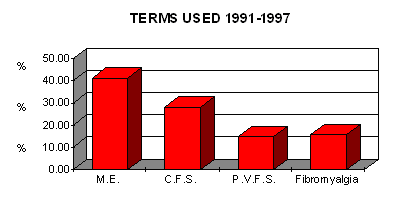| |
TREATMENT STUDY
TREATMENT STUDY REPORT
In 1998, The Irish ME Trust received completed questionnaires from 500 ME/CFS sufferers which enquired as to:
When their symptoms began; what was the term used in diagnosis (M.E., C.F.S. P.V.F.S., Fibromyalgia, Other); who made the diagnosis (GP, Acupuncturist, Hospital Consultant, Reflexologist, Homeopath, Faith Healer, Other); whether any treatment helped; extent of improvement; and whether it was felt that improvement came as a direct consequence of their treatment?
The reason for the construction of this type of questionnaire was to ascertain the benefits, as reported by sufferers, of the various therapies available and also to examine the terminology used in diagnosis.
TERMINOLOGY
When ME/CFS sufferers get a diagnosis of their condition, the terminology used can sometimes be very confusing. If a doctor tells a patient that they don't suffer from ME, but suffer from Chronic Fatigue Syndrome, does this mean that their problems are somehow less severe than that of a neighbour who has been diagnosed ME by a different doctor? What happens if a particular doctor favours the term - Post Viral Fatigue Syndrome? It can only be post viral if there was a virus to begin with. But in 20% of cases of ME/CFS, patients have testified to there having been no virus present.
There are varying initial stages for the person presenting with an ME/CFS type illness. The most common case is in fact when the person comes down with a virus resulting in flu like symptoms, headaches, sore throat, pains and aches all over, hot and cold feeling, not sleeping or oversleeping. This person may be treated with antibiotics which could relieve some of the symptoms. But time and again the patient will return to the doctor and more antibiotics are prescribed which have no effect and the condition becomes steadily worse. After a period of time the doctor may decide that the patient needs further evaluation and will refer them to a Consultant Physician where the patient is often told they may have ME, CFS or Post Viral fatigue Syndrome.
Another case type would be where the individual is more affected in the head area, resulting in eye, ear and throat problems. This person will often end up at the door of the Neurologist. All tests seem to be clear but if treatment is given it is often anti-depressant drugs which are used and of which there are many.
Fibromyalgia is often referred to when it is the muscles which are affected mostly. Doctors specialising in musculoskeletal pain will prefer to use this term. They will endeavour to treat it with anti inflammatory drugs, muscle relaxant drugs or painkillers.
Although it is widely acknowledged that ME and Fibromyalgia are separate but overlapping conditions, Rheumatologists in Ireland will always diagnose Fibromyalgia but never ME. In his book called 'Fibromyalgia - You and ME.' Rheumatologist Michael Kelly maintains that regardless of the label given in diagnosis, the disability profile is basically the same.
At the onset of illness, sufferers are more pre-occupied with attaining the remedy to their ills than getting hot and bothered about terminology, even if one person diagnosed as having Fibromyalgia for instance, is quite likely to be diagnosed ME. or CFS by another doctor.
The following graphs depict the percentage breakdown pertaining to the 4 main terms used in diagnosis.

As we can see from the graph above, the term ME. was by far the most commonly used in making a diagnosis up until the year 1990.

In the 1990's the use of the term M.E. continued to diminish (primarily with doctors and hospital consultants).
Since this study was completed in 1998, Chronic Fatigue Syndrome has replaced ME as the preferred term in mainstream medical circles. There are various reasons put forward for this and it should be remembered that in 1996, the Royal Colleges report from England stated that the term ME should be dropped in favour of Chronic Fatigue Syndrome.
This working group which comprised 7 psychiatrists, 5 physicians, 3 paediatricians and 1 general practitioner, concluded that the reason for dropping the term ME was that the name was pathologically incorrect. They didn't of course, fully explore the many sound reasons for retaining ME.
In response, the M.E. Alliance (comprising different ME/CFS groups) contended that labels were important to patients as well as doctors. It stated that patient support groups around the world were unanimous in their view that "chronic fatigue syndrome" is a totally inadequate way of describing the symptomatology and resulting disability. Problems could also occur where "chronic fatigue syndrome" could become a dustbin diagnosis for anybody with chronic fatigue.
It is for these very reasons that at a meeting of ME/CFS groups in London in 1995, in which the Irish M.E. Trust played a role, it was decided that the condition would best be termed ME/CFS, using the joint terms.
For more on Treatment Click ' NEXT '
|
|

